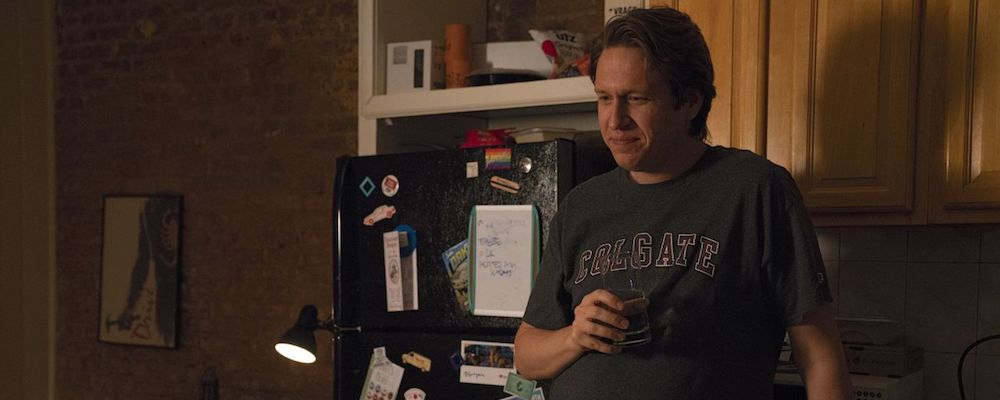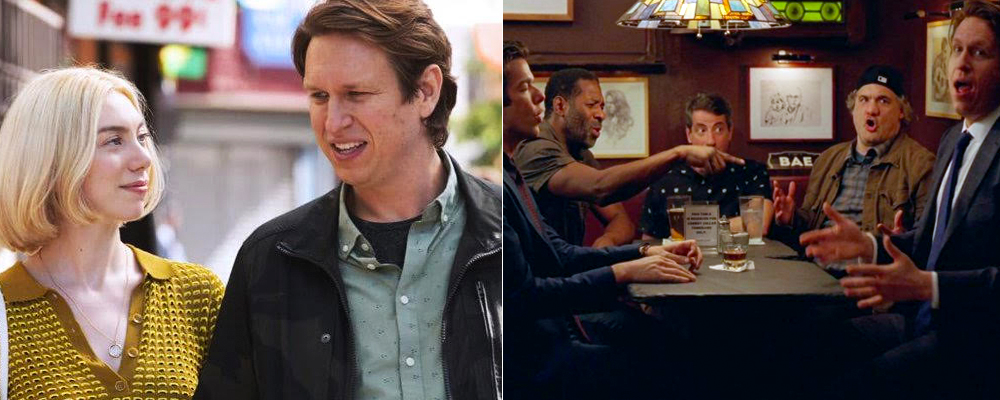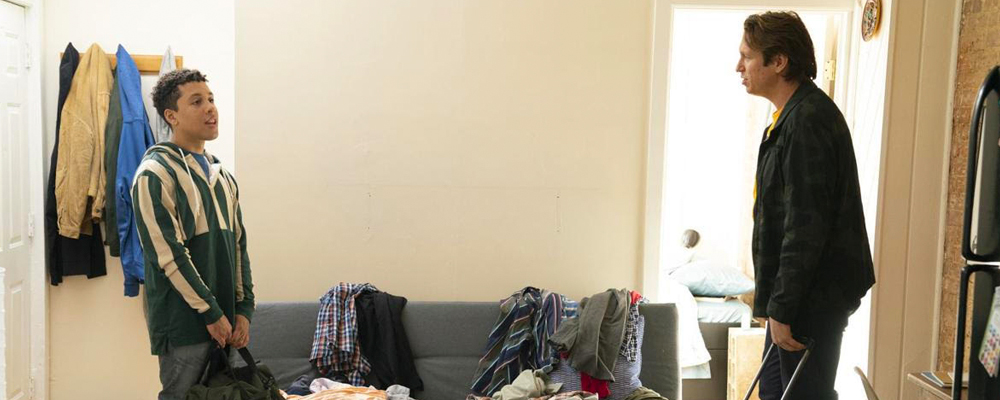Pete Holmes, Judd Apatow, and Madeline Wise on How ‘Crashing’ Offers an Inside Look at Stand-Up
Adi Mehta
HBO’s “Crashing” has returned for its third season. The comedy series is produced and occasionally directed and written by the prolific Judd Apatow. Starring creator/writer Pete Holmes, “Crashing” is in the tradition of Seinfeld, following a comedian through his journey, with all of the trials and triumphs that come along the way. The new season finds Holmes pursuing rather absurd avenues in comedy, and encountering a feisty, brazen love interest (burgeoning starlet Madeline Wise) that spins his world around. It also functions as a survey of the evolution of the comedy scene, and of popular culture in general, articulating shifts in collective mentality, and zeroing in on the zeitgeist with absolute precision. Holmes, Apatow, and Wise met with Entertainment Voice to give an inner look into their thoughts, processes, and reflections on the latest season.
There’s a fine line between intentional and unintentional irony that can either cause fervent adulation or seething contempt, depending on your take. The conversation began with Holmes delivering what Wise playfully mocked as a “dad joke,” which Holmes totally owned. It’s somewhat shocking that Wise is only now getting grand attention, as she simply radiates stardom. Regarding the last season, she watched it in a marathon with her mom, and woke up to hear her parents scrutinizing the show, particularly about what appeal she saw in main character Holmes. The short answer is that Wise’s character, Kat, is a very outspoken, bold character, and Holmes is a rather modest, somewhat meek fellow, and the two end up filling missing places in each other. The backstory, according to the actors, is that Kat wants to be with a “safe, nice boy” for a change. With the impending civil war between social justice warriors and alt-right tantrum-throwers, there’s been a lot of talk about “triggering,” which came up in our conversation, in several instances.
Much of the show is based loosely on Pete Holmes’ life. To the layman, there’s not much to know about stand-up comedy — just people telling jokes. But Holmes breaks down little details that give an inner glimpse into the intricacies of the scene. For instance, just like avant-garde musicians look down on mainstream acts, there’s a trend in the comedy scene for pompous comics to condescend to things like late night shows, once they’ve run huge festivals. The third season finds Pete finally starting to find success, and inevitably letting it somewhat inflate his ego. It has its high and low points, but ultimately ends on a lower one, although he rebounds in a more holistic way. Pete talks about finding “not a ‘break’ but like a ‘pre-break.’”
Holmes has evolved since seasons one and two. He now has a little more ego. He describes, “Unfortunately, in comedy, there’re so many examples of when an ego gets off the leash. We’ve seen Pete struggling a lot, and now he finally has own apartment and a little bit of money… He’s not the same Pete that we saw in seasons one and two, and we’re seeing a little bit of the ego start to creep out.” This is mainly based on personal experience, although Holmes clarifies, “As we keep moving forward, especially in the third season, it’s way less literal.” He talks about people who have done the Montreal Comedy Festival, and felt that doing the Tonight Show was now beneath them. At this point, Wise chimes in, saying “It’s a very sophisticated city,” whereupon Holmes jokingly rejoins, “Is it? Look to their humor.” After a bit of banter, the crowd comes to the conclusion that Montreal likes clowns a bit too much, and everyone is agreement.
Wise came into the program, and basically hijacked the show with her charm. She describes the original character as “bodacious, and curvy, and possibly Italian.” Although the casting choice ended up quite different, it’s quite safe to say that anyone who sees season three will agree that Wise was a good choice. As all great actors do, Wise put a lot of herself into the character, and has spoken about how she relates to the character of Kat, and made it her own. Kat is a bit like Jessa from “Girls,” another Judd Apatow production — a brutally honest character with a crazy streak, but a kind heart. Wise explains, “In many ways, I identified with her… I was nervous, in certain scenes that I was just going to be playing the crazy girlfriend… this caricature of a woman, but the thing about Kat is that whenever she’s acting in a way that we might consider crazy, she’s doing it in response to things that are crazy-making, that Pete does.”
There’s a palpable chemistry between Holmes and Wise on screen, and when asked about what moment in the third series resonated with them most, both agree about a scene in which Kat says, “I see everything!” In Holmes’ words, Kat “dawns a demon voice.” Look forward to it.
Judd Apatow is a veteran of the comedy scene, and as much as the series is based on Pete Holmes’ life, there’s plenty of Apatow’s experience that has made its way into the writing. Having worked as a comic since the eighties, he has witnessed the sea change in the industry, and he illustrates this pointedly in the new season by introducing a washed out character from an older generation who has fallen out of step with the world – the obnoxious, chauvinistic cheeseball who was standard fare in the eighties, but makes people recoil in terror today. Apatow explains, “There’s a lot happening now in comedy. There’s a lot of discussion about diversity and sexual harassment. I think women haven’t been treated well forever in comedy. When I first started in the mid eighties, there were very few female comedians. There are now way more, and so many brilliant female comedians, but we wanted to show what it’s like to be on the road, and how they’re treated. Sometimes you’re better than everyone else on the bill, and you’re not treated that way.” He adds, “We were also showing some of the corporatization of comedy. Now you go to these clubs, and there are big chains, and they’re in malls, and someone is watching the feed in Florida to see how it’s going. We just tried to be as realistic about it as we could, and show voices from both side.” Apatow has properly run the comedy circuit, and understands all the temptations and pitfalls that come along the way. As in any art, there’s always a dilemma regarding whether to please the masses for big bank rolls, or to follow your own natural voice, and risk a starving artist’s life. In the upcoming season of “Crashing,” Apatow presents this with the hilarious premise of Holmes embarking on an exceptionally high-paying mega-church tour, doing standup for evangelicals of the highest rank, but eventually deciding that this gig is not exactly up his alley.
There are plenty of standups on the show — Colin Quinn, Emo Philips, etc. Apatow has revealed that nearly all of the standup was unscripted, which makes sense, as it all seems absolutely natural on screen. The comics do their own material, giving something of a documentary nature to the series. The response to the show, from comics, has also been overwhelmingly positive, and what higher stamp of approval could one want from a comedy series than the approbation of acclaimed comics themselves? Apatow explains, “That meant a lot to us because comedians are very quick to say ‘This is terrible.’”
“Crashing” is a show that has absolutely grown steadily more engaging, immersive, and hilarious over time. When asked about what we can expect in subsequent seasons, Apatow characteristically responds, “I’m such a neurotic, Jewish person that in my head, I try to finish every season in a way that it would be an ok place to end the story… and then I hope they’ll let us talk about the next stage of someone’s life, but if they don’t, it’s a good place to leave off.” That said, he ends with the promise, “The next few phases are very funny,” and with his comedic record, you’d be crazy to not take him at his word.
“Crashing” season three premieres Jan. 20 and airs Sundays at 10 p.m. ET on HBO.



